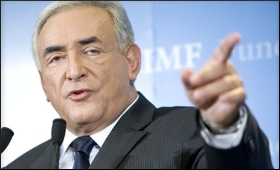|

|
Pressure on Germany to accept Greece aid
|
|

|
| IMF chief Dominique Strauss-Kahn |
| Top Stories |
 |
|
|
|
DPA | 29 Apr, 2010
The European Central Bank (ECB) and International Monetary Fund (IMF) stepped up pressure on Germany Wednesday to expedite a bailout for debt-stricken Greece, as signs emerged that Athens may need more money than first thought.
"Every day that is lost, it gets worse in Greece and the eurozone," IMF chief Dominique Strauss-Kahn told a press conference in Berlin, following a meeting with ECB chief Jean-Claude Trichet and german Finance Minister Wolfgang Schaeuble.
The Greek debt crisis intensified Wednesday amid a renewed fall in markets, after the international rating agency Standard and Poor's (S&P) Tuesday dramatically downgraded Greek bonds to junk status and cut the credit rating for Portugal, which is also battling to clean up its state finances.
On Wednesday, Spain followed suit as S&P downgraded its rating from AA+ to AA, describing the country's economic prospects as negative.
The news that Spain's credit rating had been downgraded resulted in the euro sliding again in late afternoon European trading, declining by 0.4 percent to $1.3117, its lowest level for a year.
But the prospects of the new round of Greek cuts being agreed to by the end of the week helped to introduce an element of composure into financial markets in late trading Wednesday.
Stocks in Athens were also stable with the key index closing above the 1,700 points level at 1696.68 points - an increase of 10.67points, or 0.63 percent rate.
However, Europe's blue-chip Stoxx 50 index closed down 0.9 percent at 2543 after tumbling 1.4 per cent earlier in the day.
Greece's perilous financial state has also fuelled speculation that the nation might require additional aid to help it limp through the crisis.
Speaking in Sao Paulo where he is on an official visit, German Economy Minister Rainer Bruederle said that in the three years to 2012, Greece would receive some 135 billion euros ($178.1 billion) in loans, of which Germany would pay 8.4 billion a year, the highest among the 16-member eurozone states.
"I can't rule out," he added, "that it will be a higher amount."
Greece was forced to request a European-IMF financial lifeline after a surge in borrowing costs.
Faced with widespread German voter anger about throwing Greece a financial lifeline, German Chancellor Angela Merkel is insisting on strict conditions to apply to any Greek bailout.
With time running out for Greece, Merkel has come under fire amid claims her government was exacerbating the crisis by delaying a decision on the legislation to help activate the financial lifeline.
Merkel suggested that the initial decision for Greece to join the eurozone may have been mistaken, after meeting the head of the International Monetary Fund (IMF), Dominique Strauss-Kahn.
"It became evident that the decision was possibly not checked thoroughly enough," Merkel said, referring back to the decision for Greece to join the eurozone in the year 2000.
Officials from the IMF, ECB and the European Union (EU) are currently in Athens attempting to reach agreement on a round of new measures aimed at slashing Greece's ballooning deficit and budget level, which is expected to the completed by the end of the week.
For his part, Trichet said Athens had to agree to a program of savings that was "courageous and convincing."
Schaeuble said during the press conference that legislation to activate Germany's contribution to the emergency line of credit could be ready for parliament as early as next Monday, provided Athens agrees to the new rounds of budget cuts.
At a separate press conference, Merkel said the IMF and the European Commission need to rapidly devise a programme with Greece.
"Everything else depends on that," she added.
After talks with Strauss-Kahn, Merkel later agreed that the moves to activate the bailout should be accelerated.
Speaking to reporters, Strauss-Kahn declined to set out any detail on the talks taking place in Athens, saying they were still negotiations. Greece is in a very difficult situation and slashing its debt level can't be done "without being painful," he said.
But both the IMF chief and Trichet expressed confidence that the crisis surrounding Greece would be resolved.
"The problem will be fixed," Strauss-Kahn said. "Athens is committed to doing what is needed.
Asked whether Greece would be able to repay the loans, Strauss-Kahn told reporters, "There is no programme from the IMF that has not been repaid in the past.
|
|
|
| |
|
|
|
|
|
|
|
|
|
|
|
|
|
|
| |
| Customs Exchange Rates |
| Currency |
Import |
Export |
US Dollar
|
84.35
|
82.60 |
UK Pound
|
106.35
|
102.90 |
Euro
|
92.50
|
89.35 |
| Japanese
Yen |
55.05 |
53.40 |
| As on 12 Oct, 2024 |
|
|
| Daily Poll |
 |
 |
| Do you think Indian businesses will be negatively affected by Trump's America First Policy? |
|
|
|
|
|
| Commented Stories |
 |
|
|
|
|
|
| |
|